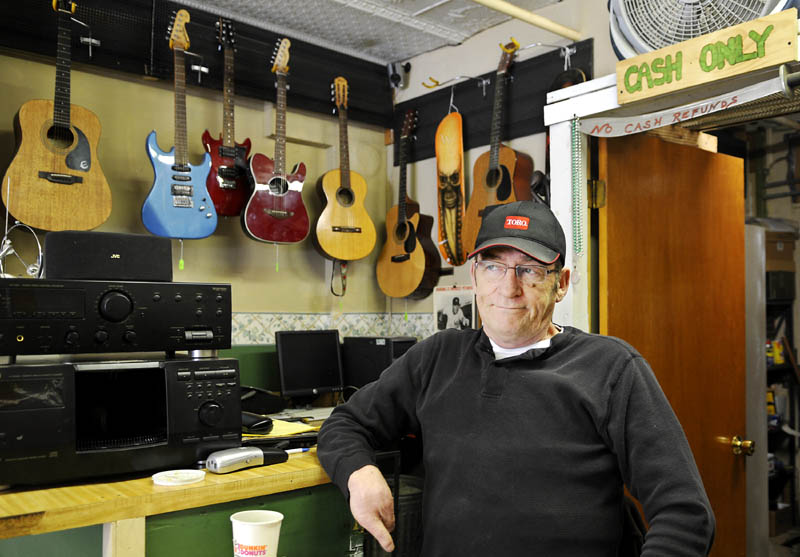AUGUSTA — While out campaigning last summer, Rep. Lori Fowle came across a couple who had been robbed of family jewelry that was found later only after it had been melted down.
The Vassalboro Democrat thought their experience might mean that state laws about pawn shops should be tightened to make it easier for law enforcement to find stolen objects and to give them more time to conduct investigations.
The result is L.D. 71, “An Act to Amend the Laws Governing Pawn Transactions.”
“I’m not looking to make it harder on pawn shops, but I want to help the victims of these crimes,” she said.
In this particular instance, the couple — who did not want to be identified, because they fear retaliation — was victimized by burglars who were convicted later on multiple counts of burglary related to break-ins in Kennebec and Oxford counties in 2009 and 2010. Sarah M. Vitale and Luke J. Greenlaw were linked to crimes in Hallowell, China, Monmouth, Pittston, Sidney, Vassalboro, Albion, Weeks Mills and Windsor.
They had a history of coming to pawn shops just before closing time to “pawn a lot of jewelry,” Kennebec County Assistant District Attorney Paul Rucha said in April 2011 when Vitale was sentenced to three years in prison and six years of probation. Fowle is married to former Kennebec/Somerset District Attorney Evert Fowle, who left that position to become a District Court judge last February.
Fowle’s bill, which will get a public hearing in the coming weeks before the Legislature’s Labor, Commerce, Research and Economic Development Committee, proposes to make four significant changes to state law by requiring pawnbrokers to:
* Take digital photographs of property pawned or purchased.
* File those photographs with local law enforcement once a month.
* Hold on to items for at least 30 days after the expiration of the repurchase period.
* Hold on to an item for at least 60 days if they purchase personal property with no condition of repurchase.
Fowle’s bill, and at least one other that proposes to impose new rules on pawn shops, is likely to draw fierce opposition from pawnbrokers who say existing law already requires them to work closely with police.
Rick LaChapelle, who owns six pawnshops in Maine, including one in Augusta and two in Portland, said very few items that come in to his shops are stolen. State law already requires shops to provide detailed descriptions of all items that are brought in, and they must record the name and residence of the person selling items to the shop.
LaChapelle said they also must abide by local ordinances that go beyond state law.
His shops in Lewiston and Portland submit electronic reports to police, but he doesn’t think the system is set up to accept digital photographs. He envisions having to keep thumb drives full of photos that may or may not ever be needed by police.
In Portland, there’s already a 10-day waiting period before resale, and in Lewiston it’s 15 days. Augusta has no local restriction on how quickly items can be resold, he said.
“There’s no other industry out there that has to put out money and is told you can’t do anything with it for 60 days,” LaChapelle said. “I really wish I had the opportunity to sit down with representatives before they write something like that to give them more knowledge of the field. Business is tough enough as it is.”
Gardiner Trading Post owner Lonnie Babb said he thinks Fowle has been watching too many reality television shows that feature the inner workings of pawn shops. In recent years, “Pawn Stars” on the History channel and “Hardcore Pawn” on truTV have shown what it’s like inside pawn shops in Las Vegas and Detroit, which is not at all how things work in Maine, Babb said.
Babb, who’s been in business for 19 years, said if the state wants to put subject pawnbrokers to more regulations, it should consider allowing them to charge higher interest. The maximum interest allowed now is 25 percent.
“This bill is more time and expense to us,” he said. “If they wanted to add another 5 percent on, it would justify it. It would come out of (the customer). It’s called passing it along like everyone else.”
Fowle said she understands the problem goes beyond pawn shops, and that it stems from the cycle of drug addiction, theft and sale of stolen items to get more drug money.
“How can we slow the process down?” Fowle said. “How can we put the brakes on a little bit so they can investigate it?”
Susan Cover — 621-5643
scover@mainetoday.com
Send questions/comments to the editors.



Comments are no longer available on this story